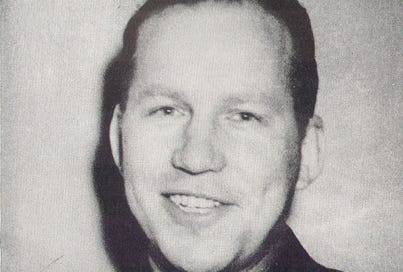Hal Boyle told mothers about their sons on the front lines
Hal Boyle might not have the most recognizable name these days, but he may have been the most widely read U.S. correspondent during World War II.
The Associated Press stalwart, who was born Feb. 21, 1911 (not July 24, as Wikipedia says), landed with American troops in North Africa and covered their progress through Sicily, Italy, Normandy and eventually into Germany. Throughout those campaigns, his regular column, "Leaves from a War Correspondent's Notebook," appeared in hundreds of newspapers. And as an AP reporter, he also chipped in with standard news stories several times a week — usually from the midst of the action.
“You’ve got to be up there with the troops when they’re taking it to get the real drama,” he once said.
The son of a Kansas City butcher, Boyle found quickly that he related to those men at the sharp end. As his AP colleague Don Whitehead wrote in May 1945: “He fell in love with the American infantry back in North Africa and always believed it was the infantryman who would win the war.”
Boyle covered deadly serious topics with an approachable style, and his columns were self-deprecating whenever possible. In a piece printed in the AP's internal magazine in March 1944, he described the state of the Italian front:
"Reporting the war in Italy is much less a pleasure than it was in Sicily, where the Americans moved so fast it took a marathon runner to keep up with them. In Italy the Germans are dug in and the way they throw artillery around you would think they expected the Allies to pay the war bill.
"Nothing takes that Richard Harding Davis complex out of your system like an artillery barrage. You really long for civilian days at home when life was a simple routine of suicides, husband poisonings, elections, paternity suits and ax murders."
On May 7, 1945, the day the war in Europe ended, Boyle was awarded the Pulitzer Prize for Correspondence. As with the man honored in 1944, Boyle's friend Ernie Pyle, the committee generally cited the AP man's entire body of work in covering the war throughout the previous year.
When a reporter informed Boyle’s mother Margaret that her son had won the Pulitzer, she had this reaction: “Deep in my heart I am proud that Harold won the prize, but the greatest thing is through his column he told hundreds of mothers about their sons.”
Boyle would remain with the AP his entire career, going on to cover the conflicts in Korea and Vietnam as well. He filed his final column in February 1974, months after being diagnosed with ALS. He mentioned in that farewell piece that he had put more bylined stories on the AP wire than any other writer in the wire service's 126-year existence.
A little over a month later, on April 1, 1974, Boyle died of a heart attack at his New York apartment.




